An eggplant war is going on in India, with immense implications for agriculture.
Familiarity with “eggplant parmigiana” might tempt us to think that the crop originated in Italy. However, it is India that is the geographic home for this vegetable, where it has been cultivated for hundreds of years.
However, it is not referred to as eggplant in its native habitat—the name there is “brinjal” in the English language. In the Tamil language that I grew up speaking at home, this vegetable is called “kaththarikai.”
When we were young, my siblings never cared for the brinjal dishes, which meant that I could eat that much more of my mother’s tasty preparations. However, mom rarely cooks this anymore because dad has suddenly become allergic to this vegetable after almost 80 years of enjoying it in various forms! A small helping of brinjal immediately translates to rashes that then take at least a fortnight to go away.
It is a bizarre coincidence that dad’s eggplant allergy started about the same time that India started debating whether or not to allow the cultivation of genetically modified (GM) brinjal. Of course, this correlation has no causation at all. But, I suspect that it is all the more the reason for dad to write off brinjal for the rest of his life.
The goals of genetic modification to this native vegetable are straightforward. Bt-Brinjal, as the GM variety is known, is a trans-genic brinjal that was developed by the global leader in this field, Monsanto, through its subsidiary. The idea is that introducing the soil bacterium Bacillus Thuringiensis (Bt) into the genetic structure will make the plant more pest-resistant because the insects that attack the plant will, in turn, fall victim to the Bt toxin. This approach will, theoretically, increase yields and reduce the need for synthetic pesticides.
The opposition to this Bt-brinjal is along the same lines of concerns over any GM crop. Do we know enough about how it might affect human health? Will the GM crop drive out the native strains?
For now, the federal government has imposed a moratorium, and the statement issued by the Environment Minister, Jairam Ramesh, reflects the concerns of those who oppose Bt-brinjal. The minister, whose graduate studies in science and public policy were at MIT and Carnegie Mellon University, declared that the moratorium will be in place “till such time independent scientific studies establish, to the satisfaction of both the public and professionals, the safety of the product from the point of view of its long-term impact on human health and environment, including the rich genetic wealth existing in brinjal in our country.”
However, this Bt-brinjal war represents a much larger issue. Demand for fruits and vegetables will increase in this largely vegetarian country of more than a billion people not merely because of the large population but because of the growing affluence.
In meat-eating lower-income countries undergoing economic growth and development, studies show that increasing affluence triggers growth in the demand for meat. In China, for instance, thanks to the rapid economic growth, per capita meat consumption more than doubled in a short period between 1985 and 2000, according the estimates from the Food and Agriculture Organization.
In the case of India, the affordability of the growing middle class will quickly translate into greater demand for vegetables and fruits, even more than the growth in meat consumption. But, conventional agricultural practices will not be able to satisfy this affluence-driven consumption. At the same time, there is a limit to which fertilizers and other modern agricultural practices can increase yields. Further, people in India—and in the rest of world, including here in the US—are also a tad worried about dependence on chemicals in the food chain.
So, to a large extent, this war over Bt-brinjal is more than about the brinjal productivity itself. This is also setting the stage for decisions that will have to be made regarding a whole range of crops that are viable candidates for genetic modification as a route for increasing productivity.
Well, I know at least one person who is relieved to be on the sidelines of this Bt-brinjal war—my father, who has stopped eating kaththarikai!

























